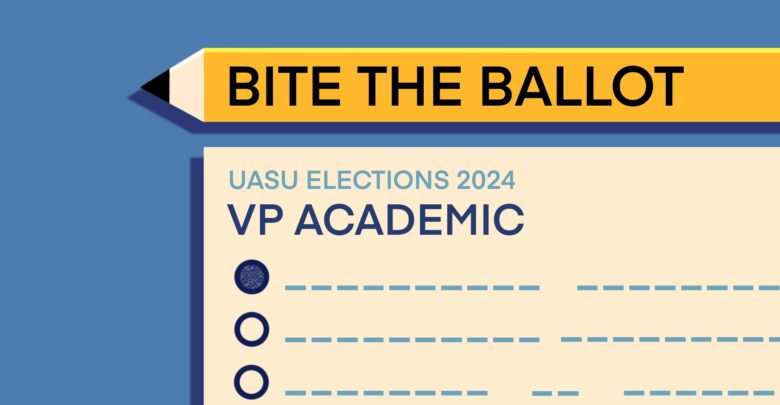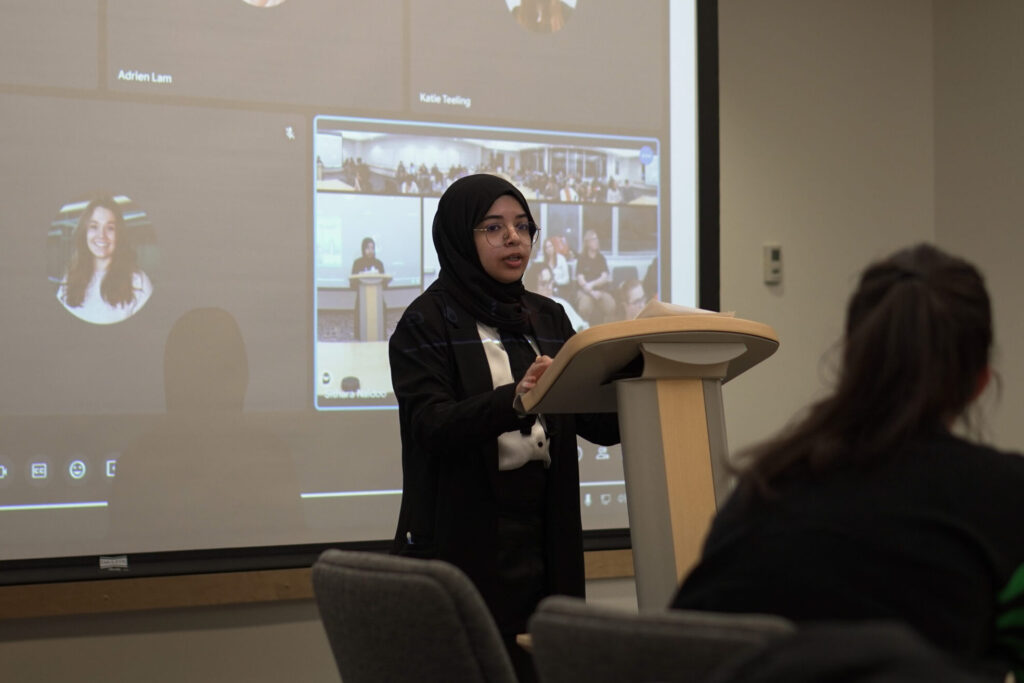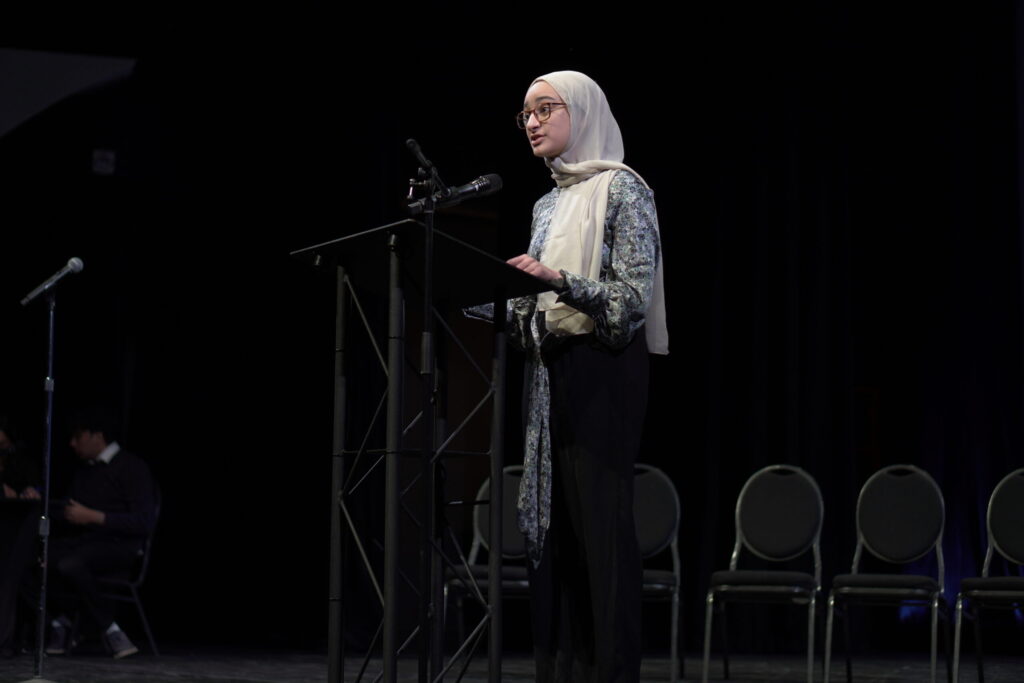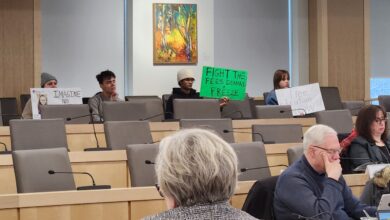 Noor Chaudhry
Noor ChaudhryThe 2024 vice-president (academic) (VPA) race has been nothing short of an exciting competition between Layla Alhussainy and Farah Elgaweesh. Both candidates continuously proposed ideas over the course of the past week, and appear to offer a plethora of promises to University of Alberta students. Although the two campaigns are similar, whose will appeal to students the most?

Layla Alhussainy
Alhussainy has plenty of experience around campus. She is the current Vice President Internal of the Organization for Arts Students and Interdisciplinary Studies (OASIS), and sits on the General Faculties Council (GFC) and the Council of Faculty Associations.
From the beginning, Alhussainy has stated that her campaign revolves around advocating for accessible learning, an inclusive learning environment, and university administration accountability. She has also proposed hybrid learning to accommodate students; stressed the importance of prioritizing Equity, Diversity and Inclusion (EDI); the normalization of artificial intelligence (AI) in classrooms; and decolonizing education. However, her ideas weren’t fully fleshed out, making them seem more like unrealistic ideals than attainable promises.
The solutions she did give seemed out of reach, such as pledging to increase the number of professors and teaching assistants despite recent budget cuts, hiring students as translators for those who cannot communicate in English or French, and implementing AI as a tool to help aid students’ learning.
Alhussainy also stressed her intention to work alongside student organizations such as the Indigenous Students’ Union (ISU) to ensure accessibility and transparency for students. Disappointingly, she did not elaborate on how she will go about this. More details would have made for a stronger argument — something I had hoped to see from Alhussainy.
Based on Alhussainy’s performance during the forums, I believe that she has established a strong influence in this election. Unfortunately, due to a personal emergency, she was unable to attend the Myer Horowitz forum. I worry her absence might impact how students view her and her campaign, since the Myer Horowitz is usually the most-attended forum each year. Although she had no control over the situation, I worry that this will impact support for Alhussainy.

Farah Elgaweesh
Since the start of the campaign, Elgaweesh demonstrated a strong passion for advocating about issues that resonate with her. She has re-iterated several times over the course of the forums that she is advocating for increased accessibility for learning, enhanced academic support, and EDI.
Some of her main focuses include expanding the Zero Textbook Cost (ZTC) program, creating accessible student resources, and reducing wait times for academic advisors.
Unlike Alhussainy, her proposals seem feasible with carefully thought-out solutions. These include consulting with university administration and groups, such as working with the Indigenous Learning Committee to advocate for accessible learning resources for Indigenous students. She also mentioned consulting with student groups to learn the specific needs of students. During her campaign, Elgaweesh took a more active role in understanding and addressing students’ needs, and it shows. As well, her ideas are innovative, which is refreshing for a platform that is notorious for long-term projects with no hard end date. One such example was centralizing academic services such as CampusBridge. Her ideas surrounding this platform point demonstrate that in the face of student concerns, Elgaweesh can find tangible solutions.
Elgaweesh used the Myer Horowitz forum to her complete advantage. In addition to the proposals she has mentioned at the past four forums, she mentioned the inspiration she obtained from consulting with various student associations, communicating with the current VPA, Pedro Almeida, and reading GFC and SU meeting minutes. With this amount of dedication, there is no denying her commitment to ensuring that she is up-to-date with the concerns of students. In addition to expanding the Zero Textbook Cost program, she aspires to centralize academic opportunities for students and address classroom harassment. Eglaweesh had already addressed how she plans on expanding academics in past forums, so I wished that she had taken this opportunity to discuss how she will address classroom harassment.
Since Alhussainy couldn’t attend the Myer Horowitz forum, Elgaweesh had the floor. Instead of debating her opponent, Elgaweesh answered moderator questions. As a result, she had a slight advantage, and was able to further expand on her platform ideas. But, Elgaweesh had given such a consistent performance in the forums leading up to this, that it did little to give her the final push.
Who will win, and who should win?
When it comes to addressing the same concerns, both candidates have repeatedly provided different solutions. Elgaweesh has continuously proved that she had conducted plenty of research to develop her proposals. Her consistent answers and solutions seem more realistic, and demonstrated her preparedness with the entire campaign. If Alhussainy had taken the time to carefully prepare her platform and developed her answers at the forums, I think the race would be closer. However, this is not the case, and because of this I think students will choose to support Elgaweesh.
Alhussainy is a very promising candidate with plenty of ideas, but students need someone who is better able to advocate for them. Elgaweesh has the plans and potential to be the representative that students need. Because of her detail-oriented campaign, I believe she is the candidate that should win.




